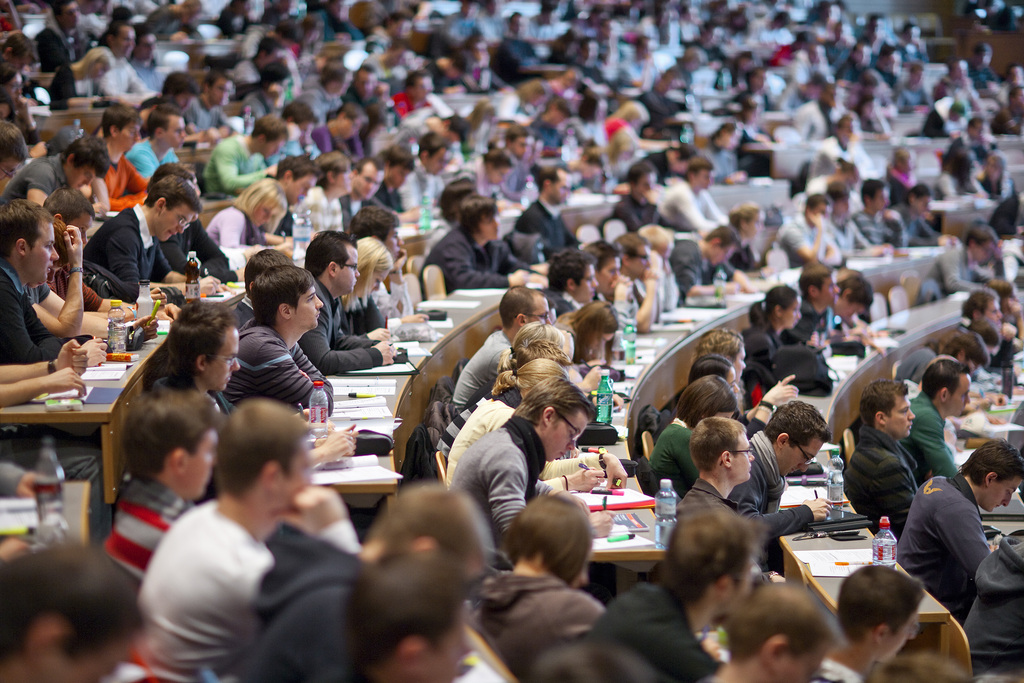Universities tested by foreign student influx

The rising influx of foreign students to Swiss universities is bringing more international talent to the country. But the debate on who foots the bill for welcoming such bright young minds is tying academics and legislators in knots.
Switzerland prides itself on having some of the lowest tuition fees in the world, subsidised by the federal and cantonal authorities. This gives students access to higher education regardless of income, but taxpayers are also shelling out for foreigners.
Top universities are now bulging at the seams with new students and frequently cry out for more cash to help them cope. At the same time, the proportion of overseas students is constantly rising – from 23 per cent in 1990 to 38 per cent in 2011.
Swiss universities jostle with international competitors to reel in the brightest overseas talent to boost domestic prowess in science, technology and other fields of research. In addition, business leaders welcome highly educated foreigners to help plug workforce gaps.
But allocating the cost of hosting raw foreign talent has been the subject a long standing – and as yet unresolved – political debate that has run on for years.
“How many students can you take on top of domestic students, and who is going to fund them – the students themselves, their country of origin or Swiss taxpayers to an unlimited degree?” Anders Hagström, Director of Global Educational Affairs at Zurich’s Federal Institute of Technology (ETHZ), told swissinfo.ch.
Charge foreigners more
Attracting overseas students, researchers and teaching staff is “part of the genetic make-up” of ETHZ, according to Hagström. “Swiss students get exposure to an international environment without ever having to leave Zurich,” he told swissinfo.ch.
But rightwing People’s Party parliamentarian Peter Keller does not believe that Swiss taxpayers should subsidise an increasing ratio of foreign students.
Last month, Keller introduced a parliamentary initiative demanding that the two federal institutes of technology in Zurich and Lausanne charge foreigners twice as much for tuition as domestic students.
“Swiss universities are funded by the Swiss taxpayer first and foremost for the education of Swiss students,” his motion read. “Foreign students are welcome. [But] they should adequately finance their [own] studies.”
The initiative – and student anger – forced the federal institutes to postpone plans to double tuition fees for all students, irrespective of nationality. With enrolment numbers rising 50 per cent since 2004, the extra income would have been set aside to fund increased teaching needs.
The Swiss Union of Students said it was “outraged” by the initiative, adding that it would fight against the “socio-economic” discrimination of students.
“Foreign students bring higher quality, greater internationalisation and different points of view to Swiss universities,” union executive member Thomas Leibundgut told swissinfo.ch. “Many of them will stay on in Switzerland, helping the economy to grow and the country to innovate, so investment in their education will be returned.”
The union called instead on the government and cantons to stump up more cash to fund “Switzerland’s only natural resource” – education.
(Tuition fee for foreigners in brackets if different to domestic student charges)
Federal Institute of Technology Zurich: CHF1,288
Federal Institute of Technology Lausanne: CHF1,266
University of Basel: CHF1,400
University of Bern: CHF1,310
University of Fribourg: CHF1,310 (CHF1,610)
University of Geneva: CHF1,000
University of Lausanne: CHF1,160 (CHF1,360)
University of Lucerne: CHF1,620 (CHF2,220)
University of Neuchatel: CHF1,030 (CHF1,580)
University of St Gallen: CHF2,452 (CHF4,252)
University of Zurich: CHF1,538 (CHF1,738)
University of Italian-Speaking Switzerland: CHF4,000 (CHF8,000)
(Source: Swissuniversity.ch – fees valid for 2012-2013 academic year)
Finding the funds
But state funding, while increasing at above inflation levels, is still barely sufficient to keep pace with growing student numbers. More than half of Swiss universities already ask foreigners, who face higher than average living costs in Switzerland, to pay more than locals in tuition fees.
While cantons subsidise each other if students choose to study elsewhere in the country, efforts to get other countries to contribute to the cost of their citizens studying in Switzerland have so far foundered on Germany’s refusal to accept the proposal.
As a result, the University of St Gallen has been ordered to cap the number of entrants from abroad each year to reduce the financial burden on the canton.
Ticino has gone down another route, charging the amount it would receive from inter-cantonal subsidies directly to foreign students.
This group accounts for two thirds of all enrolments at the University of Italian-Speaking Switzerland (USI) in Lugano, and they pay CHF8,000 ($8,400) per year in tuition fees. Swiss students, who can take advantage of cantonal subsidies, pay half as much.
Balancing act
USI’s tuition fees are several times higher than the national average for both domestic and foreign students. USI spokeswoman Cristina Elia explained that the Ticino cantonal authorities took the decision to help meet funding requirements.
“Assuming that the academic world knows no boundaries, we must find sustainable models when it comes to expenses,” Elia told swissinfo.ch. “Our model requires a more direct contribution on the student’s part.”
Finding the right balance between getting enough income and attracting the best talent from around the world has become a continuous battle for the Swiss university system.
Federal Institute of Technology Zurich: 34.8%
Federal Institute of Technology Lausanne: 50.4%
University of Basel: 26.2%
University of Bern: 13.5%
University of Fribourg: 19.7%
University of Geneva: 38.1%
University of Lausanne: 24.3%
University of Lucerne: 14.3%
University of Neuchatel: 24.2%
University of St Gallen: 36.6%
University of Zurich: 17.7%
University of Italian Speaking Switzerland: 65.5%

In compliance with the JTI standards
More: SWI swissinfo.ch certified by the Journalism Trust Initiative











You can find an overview of ongoing debates with our journalists here . Please join us!
If you want to start a conversation about a topic raised in this article or want to report factual errors, email us at english@swissinfo.ch.